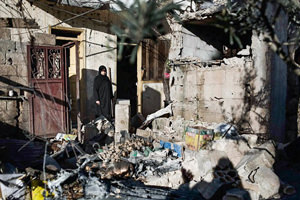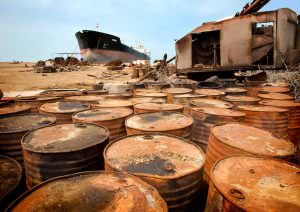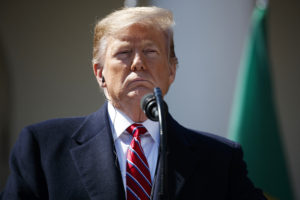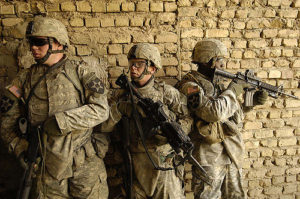From the Rubble of the Syrian Civil War, Visceral Poetry Arises
Turning away from the religious metaphors of the past, Syria’s new verse relies on realistic, raw descriptions inspired by war and expresses the hope for a united country to be formed. But the outspoken nature of this emerging literary tradition comes at a price.
Turning away from the religious metaphors of the past, Syria’s new literature relies on realistic, raw descriptions inspired by war and expresses the hope for a united country to be formed. Ex-pat Syrian writers marvel at the new poetic movement’s beauty, an unexpected lyricism that could not have been anticipated through years of studying Syrian works. Lines such as Najat Abdul Samad’s “I bandage my heart with the determination of that boy / they hit with an electric stick on his only kidney until he urinated blood. / Yet he returned and walked in the next demonstration… / I bandage it with the outcry: ‘Death and not humiliation’ ” pry at the heart of the civil war tearing the nation apart, but also kindle pride and determination.
What’s more, it is not just imagery and diction that have changed, but also the means of distribution the literature relies on. Previously, new poetry was presented at formal readings, but it is now being diffused through social media or at protests. Partly thanks to these new media, oral movements that were silenced once by censorship have been flourishing in the past few years.
Poetry is playing a large part in forming a new Syrian identity as well as fueling the language of demonstrations as people chant “verses together in the streets.” But the outspoken nature of this emerging literary tradition comes at a price, explains Al-Jazeera.
…with the country in the grips of a two-year-long civil war that shows no sign of abating, Syrian poets – and writers more generally – are in more danger today than ever before.
“Poets and writers are disappearing across the country,” says [expatriate Syrian writer Ghias al-Jundi]. “Syrian writers are caught between a double danger: the regime and the Islamists. It is a risk to write or utter a word.”
Poet Ibrahim Qashoush was kidnapped and killed in July 2011. Two writers – Dia’a al-Abdulla and Tal al-Mallouhi – are still believed to be in prison without access to a lawyer. Writer Khaled Khalifa was attacked in Damascus in May 2012 and his left hand was broken.
“Most of the poets I talk to knew there was a risk of death, imprisonment or exile if you write the truth,” says Jundi. “And even if they flee, they can also be killed abroad.”
Expatriate Syrian poets have been intimidated: [Maram al-Masri, a Syrian poet based in Paris], recently published a book of poems titled Freedom, she comes naked, inspired by social media images and posts from Syria, says she has received death threats and had loved ones in Syria forced into hiding.
…Some writers take precautions, saving lyrics under different names in case police search them or their homes, or propagating their poems anonymously. In such an atmosphere, few individual poets of this new style have risen to fame.
But although Syrian writers are still in grave danger, fear no longer controls their work. Violence is so pervasive in Syria that silence is no longer seen as a road to safety.
And so out of cruelty and bloodshed, despite years of suppression, a new Syria comes forth through creative writing, leaving us with words of courage and resolve such as poet Youssef Bou Yihea’s declaration, “My sect is the scent of my homeland, the soil after the rain, and my Syria is my only religion.”
—Posted by Natasha Hakimi
Your support matters…Independent journalism is under threat and overshadowed by heavily funded mainstream media.
You can help level the playing field. Become a member.
Your tax-deductible contribution keeps us digging beneath the headlines to give you thought-provoking, investigative reporting and analysis that unearths what's really happening- without compromise.
Give today to support our courageous, independent journalists.




You need to be a supporter to comment.
There are currently no responses to this article.
Be the first to respond.